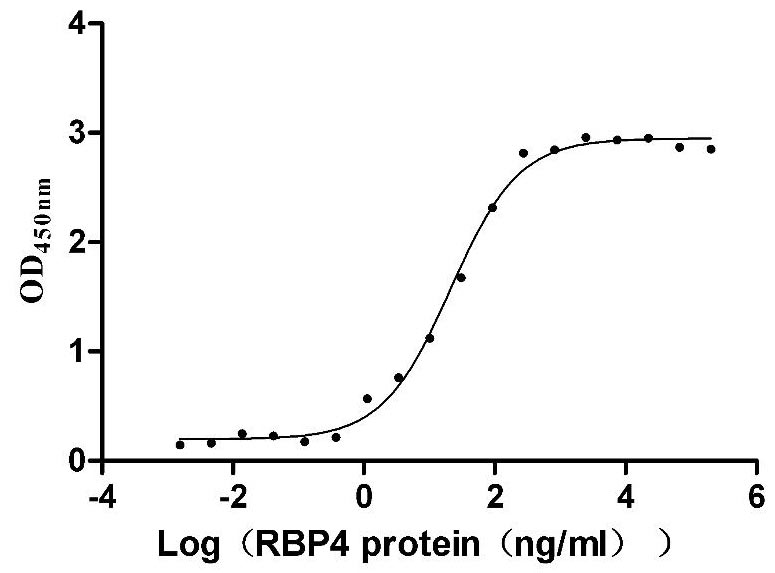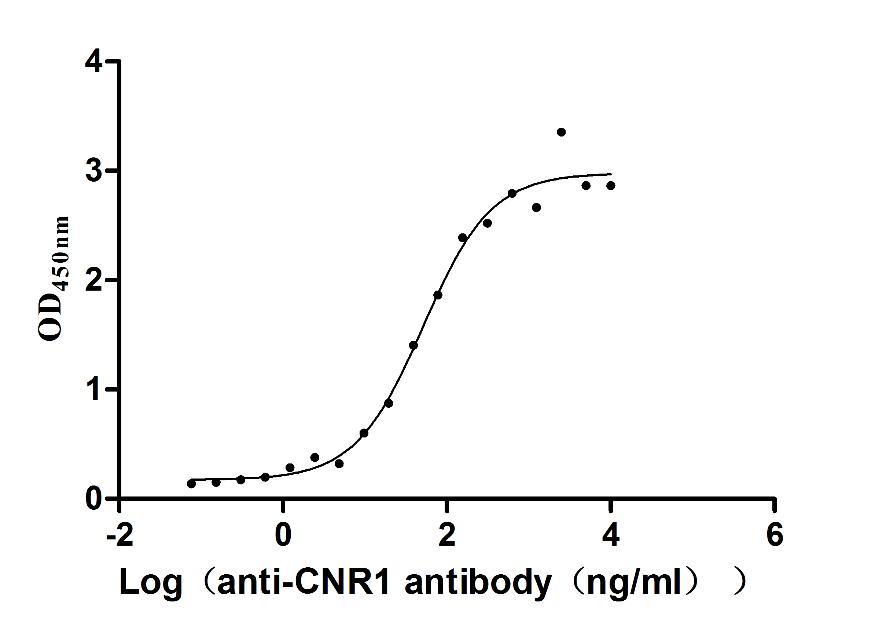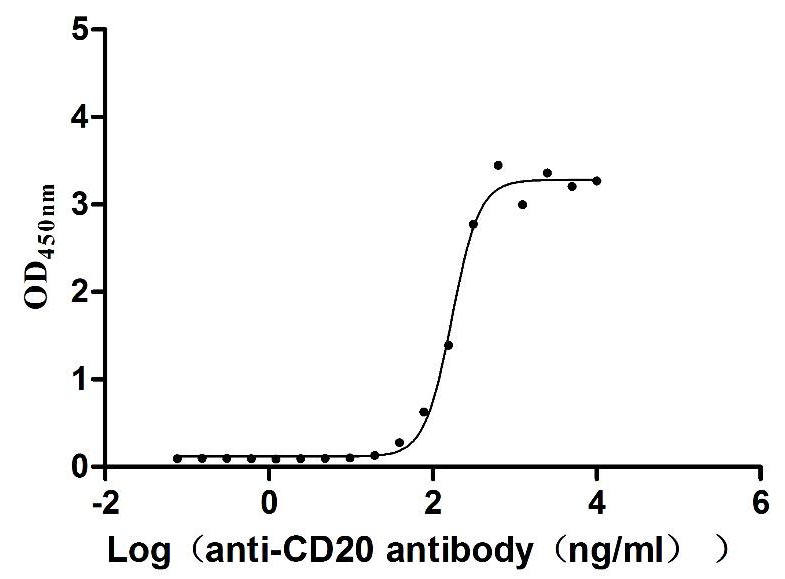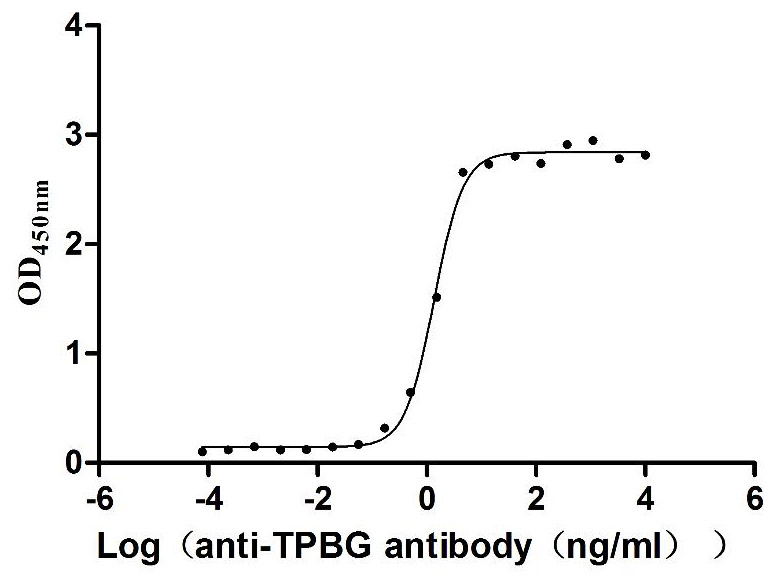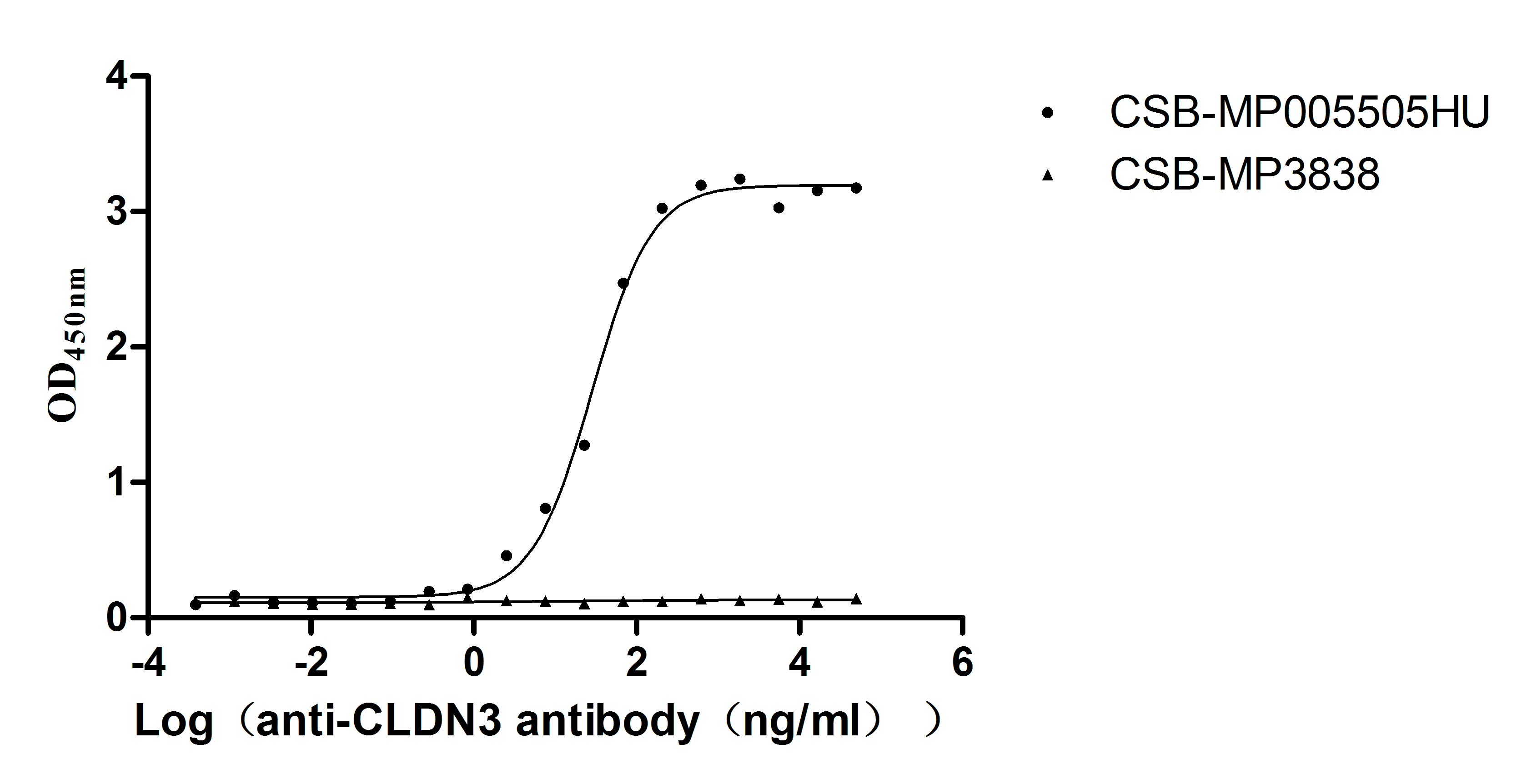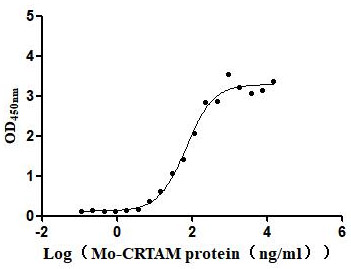Recombinant Mouse 5-hydroxytryptamine receptor 3A (Htr3a), partial
-
中文名称:小鼠Htr3a重组蛋白
-
货号:CSB-YP010890MO1
-
规格:
-
来源:Yeast
-
其他:
-
中文名称:小鼠Htr3a重组蛋白
-
货号:CSB-EP010890MO1
-
规格:
-
来源:E.coli
-
其他:
-
中文名称:小鼠Htr3a重组蛋白
-
货号:CSB-EP010890MO1-B
-
规格:
-
来源:E.coli
-
共轭:Avi-tag Biotinylated
E. coli biotin ligase (BirA) is highly specific in covalently attaching biotin to the 15 amino acid AviTag peptide. This recombinant protein was biotinylated in vivo by AviTag-BirA technology, which method is BriA catalyzes amide linkage between the biotin and the specific lysine of the AviTag.
-
其他:
-
中文名称:小鼠Htr3a重组蛋白
-
货号:CSB-BP010890MO1
-
规格:
-
来源:Baculovirus
-
其他:
-
中文名称:小鼠Htr3a重组蛋白
-
货号:CSB-MP010890MO1
-
规格:
-
来源:Mammalian cell
-
其他:
产品详情
-
纯度:>85% (SDS-PAGE)
-
基因名:Htr3a
-
Uniprot No.:
-
别名:Htr3a; 5ht3; Htr3; 5-hydroxytryptamine receptor 3A; 5-HT3-A; 5-HT3A; 5-hydroxytryptamine receptor 3; 5-HT-3; 5-HT3R; Serotonin receptor 3A; Serotonin-gated ion channel receptor
-
种属:Mus musculus (Mouse)
-
蛋白长度:Partial
-
蛋白标签:Tag type will be determined during the manufacturing process.
The tag type will be determined during production process. If you have specified tag type, please tell us and we will develop the specified tag preferentially. -
产品提供形式:Lyophilized powder
Note: We will preferentially ship the format that we have in stock, however, if you have any special requirement for the format, please remark your requirement when placing the order, we will prepare according to your demand. -
复溶:We recommend that this vial be briefly centrifuged prior to opening to bring the contents to the bottom. Please reconstitute protein in deionized sterile water to a concentration of 0.1-1.0 mg/mL.We recommend to add 5-50% of glycerol (final concentration) and aliquot for long-term storage at -20℃/-80℃. Our default final concentration of glycerol is 50%. Customers could use it as reference.
-
储存条件:Store at -20°C/-80°C upon receipt, aliquoting is necessary for mutiple use. Avoid repeated freeze-thaw cycles.
-
保质期:The shelf life is related to many factors, storage state, buffer ingredients, storage temperature and the stability of the protein itself.
Generally, the shelf life of liquid form is 6 months at -20°C/-80°C. The shelf life of lyophilized form is 12 months at -20°C/-80°C. -
货期:Delivery time may differ from different purchasing way or location, please kindly consult your local distributors for specific delivery time.Note: All of our proteins are default shipped with normal blue ice packs, if you request to ship with dry ice, please communicate with us in advance and extra fees will be charged.
-
注意事项:Repeated freezing and thawing is not recommended. Store working aliquots at 4°C for up to one week.
-
Datasheet :Please contact us to get it.
相关产品
靶点详情
-
功能:This is one of the several different receptors for 5-hydroxytryptamine (serotonin), a biogenic hormone that functions as a neurotransmitter, a hormone, and a mitogen. This receptor is a ligand-gated ion channel, which when activated causes fast, depolarizing responses in neurons. It is a cation-specific, but otherwise relatively nonselective, ion channel.
-
基因功能参考文献:
- A triad of residues aligning to Thr-152, Glu-209, and Lys-211 in Htr3, appear to be involved in side-chain interactions near binding sites in Htr3a (subunit alpha) and muscle-type Chrna1. Data suggest that mutating Htr3a triad to that of Chrna1 increases binding affinity of nicotine to Htr3a. (Htr3 = 5-hydroxytryptamine/serotonin receptor; Chrna1 = cholinergic receptor nicotinic alpha polypeptide 1) PMID: 29298898
- Results show that 5-HT3AR was expressed in GABAergic interneurons containing somatostatin or calretinin, and most strongly in the olfactory bulb, cerebral cortex, hippocampus, and amygdala. The pons, medulla, and spinal cord showed partial 5-HT3AR expression. Meanwhile, slight expression of 5-HT3AR was seen in the thalamus, hypothalamus, and midbrain; but no expression in the cerebellum. PMID: 28276429
- Knock down serotonin receptors 5-HTR3 and 5-HTR4 in neonatal cardiomyocytes resulted in significant increase of cell damage in response to hypoxia, and also led to alternation in heart beating. PMID: 27874067
- analysis of the structure from the full-length 5-HT3AR channel in the apo-state determined by single-particle cryo-electron microscopy PMID: 29410406
- Transmission of sour taste information involves communication between taste cells and 5-HT3A-expressing afferent nerve fibers. PMID: 28316078
- the recently available murine 5-HT3 receptor by identifying sites of strong interaction with particular functional groups at both the orthogonal (serotonin) site and a proposed allosteric binding site situated at the interface between the transmembrane region and the extracellular domain, was characterized. PMID: 27816008
- We conclude that cholera toxin inhibits colonic migrating motor complexes via release of mucosal 5-HT, which activates an inhibitory pathway involving 5-HT3 receptors PMID: 26990461
- It was concluded that epithelial 5-HT3 receptor may function as a mediator of gut microbiota-driven change in intestinal secretion. PMID: 28408644
- 5HT3A receptor deletion in neuroblasts impaired speed and directionality of migration and abolished calcium spikes. PMID: 28472655
- The antidepressant bupropion is a negative allosteric modulator of serotonin type 3A receptors. Results demonstrate allosteric blockade by bupropion of the 5-HT3AR. PMID: 27671323
- Studies with 16 arylguanidines found that their functional activity spanned a broad spectrum from superagonist to full agonist, partial agonist, and antagonist at 5-HT3 receptors; results confirm the utility of phenylguanidine as an extremely versatile scaffold in the design of 5-HT3 ligands with a "tunable" level of agonist or antagonist activity PMID: 27533595
- 5-HT3A-ICD is not only required but also sufficient for interaction with RIC-3 PMID: 27045630
- The data of this study demonstrated that the 5-HT3 receptor is the critical target of 5-HT action in exercise-induced hippocampal neurogenesis and antidepressant effects, but not in learning enhancement. PMID: 25403840
- The deletion of Htr3a was related to fatal arrhythmias and sudden cardiac death during pregnancy, and its activation reversed the QT prolongation. PMID: 25986676
- The results of this study suggested that 5-HT released from type III cells activates gustatory nerve fibers via 5-HT3 receptors, accounting for a significant proportion of the neural taste response. PMID: 26631478
- Htr3a is required for controlling the migration and laminar positioning of reelin-expressing interneurons in the neocortex. PMID: 25409778
- Deletion of the 5-HT3AR gene in transgenic mice abolished N-methyl-d-aspartate (NMDA) receptor (NMDAR)-dependent long-term depression (LTD) induced by low-frequency stimulation (LFS) in hippocampal CA1 synapses in slices. PMID: 25130560
- 5HT2AR and 5HT3AR were detected by RT-PCR techniques. PMID: 24969868
- Results indicate that vestibular ganglion cells express functional 5-HT3 receptor channels (with 5-HT3a and 5-HT3b subunits) and might play a modulatory role in the peripheral vestibular nervous system PMID: 24530269
- 5-HT system in the small intestine may play a critical role in regulating circadian rhythms through 5-HT3/5-HT4-receptor activation. PMID: 24492464
- X-ray structure of a mammalian Cys-loop receptor, the mouse serotonin 5-HT3 receptor, at 3.5 A resolution PMID: 25119048
- The data of this study suggested that the 5-HT3A receptor could be a key molecule regulating fear memory processes and a potential therapeutic target for fear disorders. PMID: 24344177
- Serotonin, acting in a paracrine/autocrine manner through Htr3, lowers the beta cell threshold for glucose and plays an essential role in the increased glucose-stimulated insulin secretion of pregnancy. PMID: 24218571
- 5-HT3 and NK1 immunopositive macrophages and mucosal mast cells release 5-HT and substance P, which in turn activate their corresponding receptors on mucosal cells in autocrine and paracrine manners. PMID: 23695873
- Alcohol consumption induces Htr3a promoter DNA methylation changes in blood and brain. PMID: 22834954
- Serotonin 5-HT3 receptors control morphological maturation of Purkinje cells via reelin PMID: 23318873
- In a mutant cycle analysis, a residue Asp124 of loop A in the 5-HT3A receptor forms two functionally important hydrogen bonds to the backbone of loop B, an interaction critical for receptor function. PMID: 23077719
- This study demonistrated that 5-hydroxytryptamine 3A receptor-expressing cells within the adult SVZ-RMS-OB system. PMID: 23041763
- This study demonistraed that knockout mice lacking the 5-HT(3A) receptor showed exuberant apical dendrites of these cortical pyramidal neurons. PMID: 22696545
- Activation of central 5-HT(3) receptors is more effective in hypothermia induction due to marked decrease in thermogenesis and increase in heat loss. It switched metabolism to prevalent use of lipids as the main energetic substrate. PMID: 21964386
- Stimulation of 5-HT3 serotonin receptor augments extrapyramidal motor symptoms; antagonism of this receptor alleviates extrapyramidal motor disorder symptoms. PMID: 20813116
- BDNF facilitates gamma oscillations in the hippocampus by attenuating signaling through 5-HT3 receptor PMID: 21298058
- Studies concluded that 5-HT3 receptor antagonists can reduce various opioid maladaptations. PMID: 21368652
- the relative positions of various residues in the ligand-binding site PMID: 20441748
- Both serotonin and granisetron bind to an AA binding site in the heteromeric 5-HT3AB receptor. PMID: 20409468
- A cation-pi interaction between serotonin and Trp-183 of the serotonin channel 5-HT3AR has been identified, precisely locating the ligand-binding site of this receptor. PMID: 12162741
- adaptive changes occur in the subunit composition of enteric 5-HT(3) receptors of 5-HT transporter -/- mice that are reflected in 5-HT(3) receptor affinity and desensitization PMID: 12388212
- species-dependent gating mechanism of 5-HT(3) receptors. PMID: 12457738
- serotonin transporter gene promoter variant was found in panic disorder. PMID: 12607224
- 5HT3A receptor function and trafficking is regulated by protein kinase c through an F-actin-dependent mechanism PMID: 12791692
- Results describe homology modeling of the N-terminal extracellular regions of human, mouse, and guinea pig 5-hydroxytryptamine type 3A receptors. PMID: 14626451
- The homopentameric 5-HT3A receptor is localized both to the plasma membrane and within intracellular compartments of living cells. PMID: 15009132
- hRIC-3 can act as a specific regulator of alpha7 and 5-HT3 expression at different levels by increasing the number of mature receptors and facilitating its transport to the membrane PMID: 15927954
- Residues F226 and Y234 of 5-hydroxytryptamine (serotonin) receptor are important for both 5-HT and mCPBG interactions PMID: 15966738
- results confirm the structure of the M2-M3 loop and the critical role of Pro 8* in the 5-HT3 receptor; in addition, they suggest that a molecular rearrangement at Pro 8* is the structural mechanism that opens the receptor pore PMID: 16281040
- the arginine 427 residue in the large cytoplasmic domain contributes to 5-HT3A receptor desensitization, possibly through forming an electrostatic interaction with its neighboring residues PMID: 16754678
- tested the hypothesis that loop F plays a significant role in conferring interspecies curare potency differences; two loop F residues make a significant contribution in determining curare potency at the 5-HT3A receptor PMID: 17260949
- These data show a role for the 5-HT(3A)-receptor subunit in the induction of behavioral sensitization to cocaine and suggest that the 5-HT(3A) molecular subunit modulates neurobehavioral adaptations to cocaine, which may underlie aspects of addiction. PMID: 17559417
- 5-HT mediates enhanced neurogenic contractions of the mouse bladder muscle by an action at 5-HT(3) receptors. The presence of the 5-HT(3) receptor was confirmed by the expression of both 5-HT(3A) and 5-HT(3B) receptor subunits. PMID: 17607564
- Results imply that the M3M4 loop is not essential for 5-HT3A receptor assembly and function and suggest that the cytoplasmic domain may fold as an independent module from the transmembrane and extracellular domains. PMID: 18227272
收起更多
-
亚细胞定位:Cell junction, synapse, postsynaptic cell membrane; Multi-pass membrane protein. Cell membrane; Multi-pass membrane protein.
-
蛋白家族:Ligand-gated ion channel (TC 1.A.9) family, 5-hydroxytryptamine receptor (TC 1.A.9.2) subfamily, HTR3A sub-subfamily
-
组织特异性:Brain, spinal cord, and heart.
-
数据库链接:
KEGG: mmu:15561
STRING: 10090.ENSMUSP00000003826
UniGene: Mm.4831


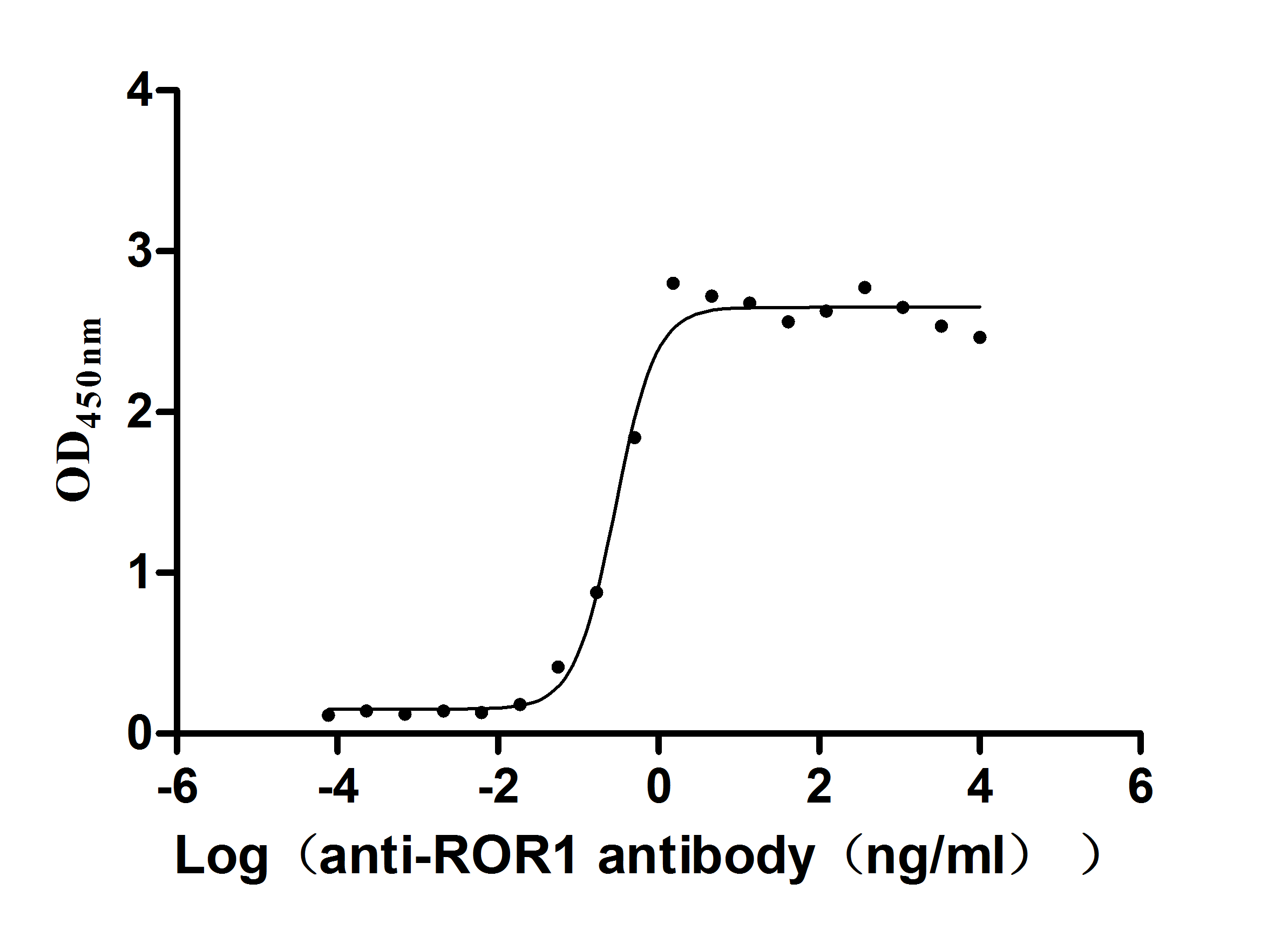
-AC1.jpg)
